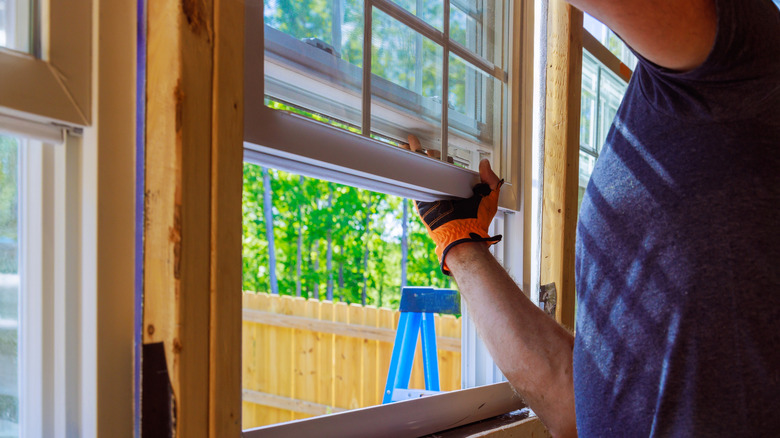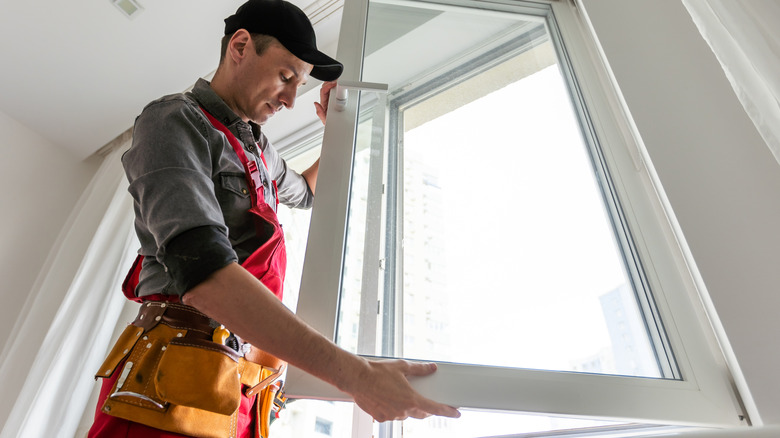What To Consider When Choosing The Right Windows For Your Home
It's easy to become overwhelmed once you start shopping for new windows. From casement windows that crank to simple sliding windows that save on space, there are lots of options out there. The cost to replace a window can be an expensive proposition even if you just have one drafty culprit, so it's important to do your research. According to Kate Land, Vice President of Product and Innovation for Cornerstone Building Brands, appearance, function, security, and quality are among the most important things you should consider when choosing the right windows for your home.
"The most common window types include double hung, casement, single hung, sliding, awning, bay and bow, mulled and custom combination windows, each of which offer unique benefits," Land told House Digest during an exclusive interview, adding, "Double hung, single hung and slider windows [are] ideal for areas adjacent to patios, walkways and decks because they open flush to the wall and do not intrude into the outside space." Land told us there are different features you need to know about casement windows. Like with awning windows, they have handles that allow you to fully open them. This also makes it easy to clean the exterior glass from inside. "They are particularly well suited for over kitchen sinks or for those preferring a more modern aesthetic," Land said.
There are also less common windows that may be right for your home. Land explained that both bay and bow windows "are popular for replacement applications in older homes." Mulled or combination windows are more custom designs "that combine multiple sizes, types and shapes of windows together for a larger, more dramatic window elevation."
Pick window materials that offer energy efficiency, security, and weatherization benefits
During her exclusive interview with House Digest, Kate Land said there are more things to consider other than appearance. "Look for windows with enhanced weather resistance features," she advised. "These can include accelerated drainage and impact-resistant windows to deter high winds and flying debris." Energy efficiency is another important consideration, as are security features: "Windows that have passed forced entry resistance tests usually offer added features which can include self-latches and impact-resistant laminated glass."
Another critically important consideration is which window material is best. "Windows come in a variety of materials, including vinyl, aluminum, fiberglass and wood," Land told us when we asked her to break down the most common window materials and their pros and cons. "Vinyl windows are durable, thermally efficient and can withstand hard weather conditions," she said, adding that "they are virtually maintenance-free."
The building material expert was less enthusiastic about other window materials like aluminum, fiberglass, and wood. "Aluminum is strong and cost-efficient but does not insulate well," Land said, explaining that they are low maintenance but are prone to condensation and corrosion. Fiberglass windows are another strong option that fare better in various weather conditions. "However, their rigidity makes them more complex and costly to install," she warned. And wood windows, while customizable and energy efficient, are very expensive. Plus, according to Land, "they shrink and swell with temperature changes, which can compromise their longevity and require routine painting." No matter which material you choose, you should avoid DIY window installations despite the potential savings to avoid stressed sashes, drafts, water leaks, and even mold problems.
Choose windows from brands that prioritize quality assurance and value for your investment
Figuring out how to afford new windows for your home can be a challenge. "The cost of window replacement depends on several factors," Kate Land told House Digest during her exclusive interview. She said factors like window size, style, location, and any special access requirements can drive the price up, along with upgraded features, like the "color of frames, specific hardware finishes, different glass types and screens." Land advised choosing windows from brands that use quality materials during the manufacturing process, achieve quality assurance through testing, and have received recognition for that quality by third parties. The window product expert also recommended purchasing windows for your home from an Energy Star performance certified supplier. "This benefit can contribute significantly to cost savings and help offset window costs, making this an ideal choice for renovation projects," the expert told us. In is one of the best ways to help reduce your energy costs at home.
"When working on a tight budget, consider choosing lighter weight vinyl windows in a neutral color and simple design, as well as foregoing the higher performance energy or security glass packages," Land suggested, adding, "Make sure to get multiple installation quotes to assure value for your investment and also partner with a contractor you trust. Many window dealers offer excellent financing, as well." she added. Warranties and customer support should be more than just window dressing for this major purchase, so remember to have your chosen manufacturer and installer provide you with those details in writing.


